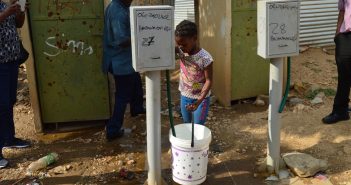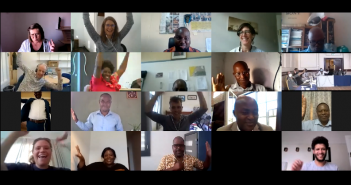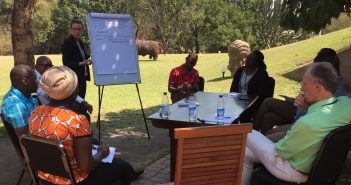Blog by: Rudo Mamombe (Harare Embedded Researcher within the GEC African Grants project)
The Future Resilience for African Cities and Lands (FRACTAL) provides opportunities for engagement on issues related to climate change and cities in southern Africa. The Global Environmental Change (GEC) Research in Africa project entitled Water and Energy Systems, Urban Governance and Decision-making project in Harare (Zimbabwe) builds off FRACTAL. Given the growing importance of inter- and trans- disciplinary approaches towards adaptation to climate change, both of these proejcts integrate different stakeholders in the water and energy sectors in Harare.
An inception meeting was held in December 2016 for the GEC project to bring together different stakeholders in the water and energy sectors of the city of Harare. This meeting aimed at building awareness and understanding of the project at the same time soliciting input from them. The meeting was indeed an eye opener for the project team as they were enlightened on the city’s needs. Quite a sum of issues was raised in regard to climate change, water and energy systems in Harare. The attendees were in agreement that there is evidence of climate change and therefore a “no regrets approach” is required to address adaptation.
During the inception meeting, a number of issues were raised in relation to the city, namely; the high increase in the amount of sewage effluent in water bodies (the once ‘sunshine’ city is now being referred to by some as the “sewage farm”), water shortages in the city, and energy challenges in the city. For many stakeholders, this brings anxiety about the future of the city, especially when considering these challenges in the face of climate change. These problems are not only localized in Harare, but also present in some other FRACTAL cities in the region, for example Lusaka. However, all hope is not lost, and the GEC project (and the broader FRACTAL project) seeks to contribute to tackling these challenges in Harare while adapting to the changing climate. The GEC project provides an opportunity to work together and learn from each other’s best practices. It is important to remember that climate change can provide opportunities for new technologies and innovation in the water and energy sectors of the city of Harare.
During the inception meeting, a number of more specific issues were highlighted including limited expertise on climate change issues in the Harare City Council and limited integration between researchers and government agencies tasked with environment issues and decision-making. Through initiatives such as FRACTAL and the GEC project, the problem of limited integration will be tackled as various stakeholders (particularly those involved in decision making) will be involved in research. An important factor to facilitate this process will be improving the lines of communication between policy and academia. When this is not the case, in some instances, research outcomes remain within academia, without proper channels for incorporating these outcomes into decision-making. If decision makers do not help to share research outcomes, or if research outcomes are not effectively communicated, politics often eclipses science at the expense of the environment and the majority of the citizens.
One mechanism to facilitate integration and open lines of communication that is being implemented through the GEC project and FRACTAL, is to embed researchers in the City of Harare, where decisions are made. The Embedded Researchers are very enthusiastic about being part of such an important project, and are excited to be integrated into the FRACTAL team as a whole. These researchers have already started the registration process for MPhil studies at the Chinhoyi University of Technology. This, together with other various FRACTAL activities, is particularly significant for their capacity building.
In conclusion, although climate change impacts (especially those in the water and energy sectors in cities) are serious issues that compromise the future of African cities such as Harare, responses to these issues (including the FRACTAL and GEC Africa grant project) present an opportunity for stakeholders to come together and work towards a common objective. Such initiatives will benefit city governance in general, while at the same time building adaptive capacity to manage the effects of climate change. New doors may in the process be opened for innovation and applying new technologies.




